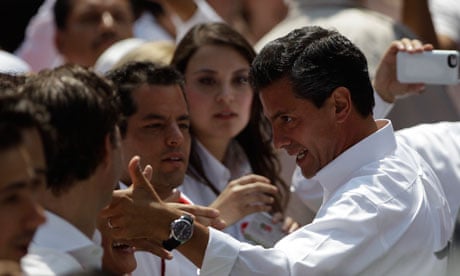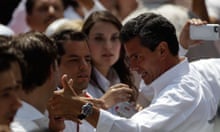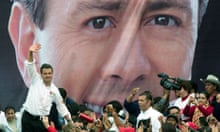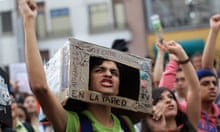Read a joint statement about this story from the Guardian and Televisa here.
A secretive unit inside Mexico’s predominant television network set up and funded a campaign for Enrique Peña Nieto, who is the favourite to win Sunday’s presidential election, according to people familiar with the operation and documents seen by the Guardian.
The new revelations of bias within Televisa, the world’s biggest Spanish-language broadcaster, challenge the company’s claim to be politically impartial as well as Peña Nieto’s insistence that he never had a special relationship with Televisa.
The unit – known as “team Handcock”, in what sources say was a Televisa codename for the politician and his allies – commissioned videos promoting the candidate and his PRI party and rubbishing the party’s rivals in 2009. The documents suggest the team distributed the videos to thousands of email addresses, and pushed them on Facebook and YouTube, where some of them can still be seen.
The nature of the relationship between Peña Nieto and Televisa has been a key issue in Sunday’s election since the development in May of a student movement focused on perceived media manipulation of public opinion in the candidate’s favour.
Televisa refused to comment on the specifics of the documents but denied suggestions it had favoured the PRI, saying it had done political work for all the major parties.
The documents, which consist of scanned copies of signed contracts as well as other instructions and proposals, suggest that Televisa subsidiaries and named Televisa executives took part in the project, putting their employees and knowhow to work to the benefit of Peña Nieto in the buildup to crucial 2009 midterm congressional elections.
The material follows the publication by the Guardian three weeks ago of a cache of documents from 2005 that appeared to detail the network’s sale of favourable coverage to a number of politicians, including Peña Nieto. The documents also appeared to contain evidence of a smear campaign orchestrated from the company against Andrés Manuel López Obrador, who at the time was preparing his first presidential candidacy. López Obrador is currently Peña Nieto’s closest rival in the presidential race, though most polls put him more than 10 points behind the leader.
Televisa has dismissed these allegations as libellous, questioned the authenticity of the documents, and demanded an apology.
According to well-placed sources, the Handcock project (“Hancock” in some documents) emerged in the runup to the 2009 midterm congressional elections.
The resounding victory that Governor Peña Nieto delivered for the PRI in the region known as State of Mexico in those elections helped cement his claim to the presidential candidacy.
One source told the Guardian the team worked in semi-secrecy within Televisa’s offices, bound by confidentiality contracts and encouraged not to use their Televisa email addresses or Televisa IPs to distribute material. A second source said external companies contracted by Televisa to produce videos and other materials destined for the web were also bound by secrecy because of confidentiality agreements. The contracts suggest that these “providers” are legally responsible for “any individual or collective complaints of all kinds” associated with the material.
One of the leaders of the team was Alejandra Lagunes, then director general of Televisa Interactive Media, the sources said. Lagunes later left the company and went on to help Peña Nieto’s chosen successor as governor of the State of Mexico win the local election in 2011. She currently holds the position of “co-ordinator of digital and social network strategy” in Peña Nieto’s presidential campaign team.
A PRI spokesman, Aurelio Nuño, denied a Guardian request to speak with Lagunes. “The campaign and the candidate Enrique Peña Nieto has no knowledge of the existence of the contract that the Guardian showed us,” he said. “Enrique Peña Nieto reiterates that he has never had a special relation with Televisa. Both as governor and as presidential candidate, Peña Nieto has sought a cordial and respectful relationship with all the media.”
A central part of the brief for the Handcock team, according to one source, was distributing pro-PRI campaign videos through mass emailing and promotion on sites such as YouTube.
The documents suggest that at least some of the videos were commissioned by Televisa from an outside production company called Zares del Universo, which was partly owned by a Televisa-associated celebrity, Facundo Gómez.
According to one of the contracts, dated 1 May 2009, a wholly owned Televisa subsidiary called Comercio Más S.A. De C.V. commissioned Zares to provide a series of short videos at a cost of 1,722,000 pesos (around US $133,000 at the time).
The contract is signed by Jorge Agustín Lutteroth Echegoyen, Televisa vice-president and comptroller. His name and signature also appear on other contracts, along with an official stamp.
In this case the “client” is identified as “Handcock” for some of the videos commissioned and “Televisa Digital” in others. Some can be found on YouTube. There is no author listed, but the titles, topics, and exact length match those detailed in the document. These include a series of six videos for a campaign mysteriously codenamed the Snoopy Concept.
The contract states that the aim is to produce “videos that mock some of the errors and weak points of the national action party”, referring to President Felipe Calderón’s PAN party. It specifies that the videos should not be signed.
Gómez told the Guardian: “We have done a lot of work for Televisa but we have never, as far as I know, produced political videos for Televisa of any kind.”
One of the episodes, entitled Enrique Peña’s Tie, jauntily rebuts criticism the then governor received for not following federal government suggestions not to wear a tie during the 2009 swine flu epidemic. It features an interview with the governor on Televisa’s flagship nightly news show in which he explains his decision as an effort “to stop projecting the image of a sick country that has really hurt our economy”.
Another of the videos, entitled The Bad Guy of Toluca, attacks the record of a former mayor of the state capital who was running for the post again in the 2009 elections. To a soundtrack of Prokofiev’s Montagues and Capulets, it types out accusations such as: “He’s the one who got divorced in order to marry his secretary, who he then promoted in his administration.”
Other contracts shown to the Guardian detail blogs and websites promoting the PRI, to be constructed by other outside companies and individuals for the Televisa subsidiaries Comercio Más and Desarrollo Vista Hermosa SA de CV.
One set of instructions to team members tells them to distribute a video and post it on Facebook and the US social networking site Hi5.
The video, the origin of which is not revealed, accuses the mayor of a city in the state of using public resources to campaign for the PAN. The text makes no mention of any party political affiliation, and ends with the words: “Send this mail to your mates … I am really pissed off about it.”
Televisa refused to meet the Guardian to discuss the allegations. It first ignored requests for comment, then proposed a meeting with legal counsel present. When the Guardian submitted a list of eight questions with a small sample document attached, a spokesman cancelled the meeting, saying the documents had not been not been submitted in a “timely” fashion.
Televisa added that Comercio Más acted for all major parties. It said: “Comercio Más is a small, wholly owned subsidiary that is and was in charge of the portal Esmas and since 2008 has been trying to develop skills for the placement of online advertisements. Comercio Más or Esmas has done presentations of its capabilities to both private and public sector. With regards to political parties, Comercio Más has signed agreements with a number of political parties, including all the major parties across the political spectrum (PRI, PAN, Movimiento Ciudadano and PRD). The scope of Esmas’s work has always been legal.”
Furthermore, after the 2009 federal elections, Comercio Más’s work and its income from political parties was audited by the electoral authority the IFE, under resolution GC223/2010. The IFE was satisfied with the review.”
But a spokesman for the PRD denied any knowledge of Comercio Más or Esmas. “I’ve never heard of it. They haven’t done any work for us, not in this [presidential] campaign or previously,” said the spokesman, César Yáñez. If Televisa or the PRI had suggested otherwise, he said, they were wrong: “It’s completely false.”
Further evidence of Televisa-commissioned work to promote Peña Nieto comes in a document apparently sent by an employee of the US company Blue State Digital enquiring about payment after the completion of “several tasks for Televisa”. The subsequent list includes “many conference calls and meetings to discuss the web strategy for Handcock”.
Blue State Digital
Blue State Digital is known for helping to develop Barack Obama’s internet strategy in the 2008 US presidential elections. Blue State Digital did not respond to a request for comment.
Another document, apparently sent by a company called Producciones Salón to the address of a high-level Televisa employee called Germán Arellano, contains the subject title “edomex proposal”, in reference to the acronym for the State of Mexico. It includes a budget for websites for the PRI in the state as well as “the design and implementation of an integrated strategy that articulates the totality of efforts around Handcock”.
The proposal also mentions plans to develop a personal blog for Luis Videgaray, a close collaborator of Peña Nieto who at the time was mooted suggested as a possible candidate to replace him as governor. The proposal promises to “position him as an opinion leader in the digital political culture and generate goodwill around his image in the State of Mexico”. Today, Videgaray is Peña Nieto’s presidential campaign manager.
A spokesman for Luis Videgaray says he denies any knowledge of the document the Guardian has uncovered. He also claims he has never hired a company or a person to manage his social media and that he directly manages his own twitter account.
The contracts detail payments to be made by Televisa subsidiaries to outside providers for the pro-Peña Nieto materials. The documents leave it unclear whether Televisa footed the bills itself.
The Guardian was unable to obtain a response from Producciones Salón, which was to be found neither at the addresses and phone numbers contained in the contract nor at those on its website.







